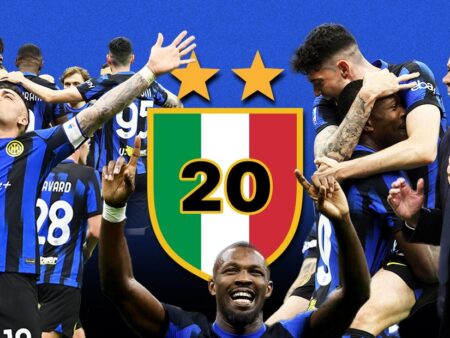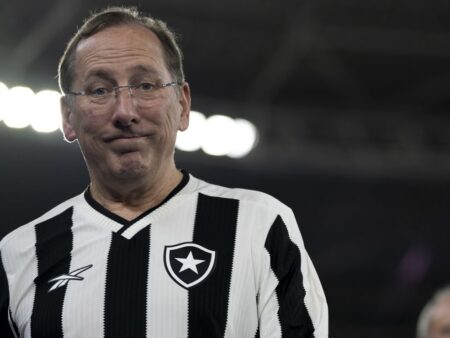La Era Levy: Más Allá de los Trofeos
Daniel Levy, una figura divisiva en el fútbol, dejó su cargo como presidente del Tottenham Hotspur el jueves, después de 24 años. Su mandato estuvo marcado por una percepción generalizada de falta de logros significativos: una Copa de la Liga, ningún título de la UEFA Europa League y una sola final de la Liga de Campeones en dos décadas. Para muchos, esto representaba un balance decepcionante. Sin embargo, al analizar su legado, surge una imagen más compleja, donde numerosos aspectos positivos se entrelazaron con las críticas.
Levy, el presidente de club con más años de servicio en la Premier League, será recordado principalmente por su sorprendente longevidad. Su extensa permanencia al frente de los Spurs encapsula perfectamente el inesperado viaje del club durante los últimos veinte años.
Ascenso desde la Mediocridad
Cuando Levy asumió la presidencia ejecutiva en febrero de 2001, después de adquirir la participación del 27% del magnate Alan Sugar, la aspiración de ganar trofeos era, por decirlo suavemente, distante. Aunque el Tottenham había sido uno de los «cinco grandes» que fundaron la Premier League, su prestigio no se había traducido en éxito en el campo. El club del norte de Londres no había terminado por encima del séptimo lugar desde la temporada inaugural de la Premier League en 1992-93, llegando incluso a coquetear con el descenso en ocasiones.
El éxito no fue inmediato, pero en pocos años, la trayectoria ascendente del Tottenham se hizo evidente. El equipo logró un quinto puesto en la temporada 2005-06, impulsado en parte por una campaña récord de 16 goles de Robbie Keane. A pesar de un desafortunado caso de intoxicación alimentaria que afectó al equipo antes de un partido crucial contra el West Ham United por el cuarto puesto, su participación en la Copa de la UEFA (ahora Europa League) la temporada siguiente marcó un hito. Bajo Levy, los Spurs participaron en competiciones europeas en 18 de las últimas 20 temporadas, una hazaña inédita para el club.
Un «Club Vendedor» de Élite
Esta consistencia se cimentó en la habilidad del Tottenham para identificar y desarrollar jugadores talentosos como Dimitar Berbatov y Gareth Bale. Aunque estas estrellas a menudo partieron en busca de títulos mayores, sus ventas generaron cuantiosas tarifas de transferencia que Levy reinvirtió. Los Spurs se encontraron en una especie de «purgatorio», siendo un contendiente perenne para la plata, pero a menudo recordado su estatus de «segundo nivel». No obstante, la estrategia de Levy fue efectiva: el fútbol, para la mayoría de los clubes, no se trata solo de ganar títulos, sino de competir y mantenerse en la élite. El Tottenham de Levy se convirtió en uno de los clubes «vendedores» más exitosos, manteniendo su presencia europea casi como una constante a pesar de las salidas de figuras como Luka Modric y Kyle Walker. Jugadores como Harry Kane (producto de la cantera), Son Heung-min, Toby Alderweireld y Christian Eriksen dejaron su huella, siendo pilares del equipo de Mauricio Pochettino que llegó a la final de la Liga de Campeones en 2018-19.
El Legado Tangible: El Estadio
El legado más visible de Levy, sin embargo, es el Tottenham Hotspur Stadium, con capacidad para 62.000 espectadores. Este recinto de última generación simboliza el ascenso del club, generando ingresos adicionales a través de partidos de la NFL y conciertos. Para cuando se inauguró el nuevo estadio en 2019, la transformación era innegable: los Spurs habían pasado de la mediocridad de media tabla a ser uno de los clubes más reconocibles del deporte, todo ello sin la inyección ilimitada de capital de un estado-nación o un multimillonario. Levy logró esta hazaña increíble sin un plan preestablecido y durante una época en la que el dinero inundaba el deporte, elevando a menudo a los principales competidores del Tottenham a cotas sin precedentes.
En esencia, Levy construyó un club tan grande que superó la capacidad de gestión de una sola persona.
Desafíos y Críticas Finales
Las críticas sobre la inversión en la plantilla se intensificaron después de la final de la Liga de Campeones. A pesar de un déficit de gasto neto de alrededor de 760 millones de dólares en los últimos cinco años (el cuarto más alto de la liga), la calidad de los fichajes fue constantemente cuestionada. De hecho, los ocho jugadores más caros en la historia del club llegaron después de aquella final, incluyendo al nuevo fichaje estrella Xavi Simons.
Sin embargo, la eficacia del gasto es otra historia. Los clubes modernos ya no pueden funcionar como una operación unipersonal. La construcción del estadio pudo haber distraído a Levy del mercado de fichajes (por ejemplo, en el verano de 2018 no hubo nuevas incorporaciones), pero la adopción de una estructura deportiva moderna tardó demasiado. Los directores deportivos tuvieron niveles de influencia inconsistentes, y solo con la contratación de Fabio Paratici en 2021 y Johan Lange en 2023 (tras la suspensión de Paratici) el club comenzó a ponerse al día con rivales como Liverpool y Manchester City, que han tenido departamentos deportivos robustos durante años. Mejorar la estrategia de fichajes sigue siendo crucial.
No fue la única decisión controvertida en sus últimos años. El Tottenham es uno de varios clubes ingleses que se han resistido a invertir más en el fútbol femenino, a pesar del auge de popularidad. La trayectoria del Barcelona, que pasó de profesionalizarse en 2015 a ganar la Liga de Campeones Femenina en 2021, es una clara señal. Aunque hay motivos para el optimismo con el nuevo CEO Vinai Venkatesham, quien fue un defensor del equipo femenino del Arsenal.
El Legado Agrio-Dulce de un Visionario Imperfecto
La crítica justa a Levy radica en que la gestión del Tottenham se hizo demasiado grande para una sola persona, lo que llevó a que varias tareas importantes quedaran en segundo plano en sus últimos años. Su destitución, aunque audaz, podría haber sido merecida. Paradójicamente, sus «fracasos» son también un testimonio de un trabajo bien hecho. Levy es quizás el único ejecutivo de su tipo en el deporte que transformó un club sin un cheque en blanco de sus propietarios, lo que representa una de las tareas más difíciles en la era actual de comercialización del fútbol.
Levy`s Era: Beyond the Trophies
Daniel Levy, a divisive figure in football, stepped down as chairman of Tottenham Hotspur on Thursday after 24 years. His tenure was widely perceived as lacking significant achievements: one EFL Cup, no UEFA Europa League titles, and a single Champions League final appearance in two decades. For many, this represented a disappointing return. However, analyzing his legacy reveals a more complex picture, where numerous positive aspects intertwined with the criticisms.
Levy, the longest-serving club chairman in the Premier League, will primarily be remembered for his surprising longevity. His lengthy spell at the helm of Spurs perfectly encapsulates the club`s unexpected journey over the last two decades.
Rise from Mediocrity
When Levy took over as executive chairman in February 2001, after acquiring Alan Sugar`s 27% stake, the aspiration for trophies was, to say the least, distant. Although Tottenham was one of the «big five» that founded the Premier League, its prestige had not translated into on-field success. The North London club had not finished higher than seventh since the Premier League`s inaugural season in 1992-93, at times even flirting with the relegation zone.
Success wasn`t instant, but within a few years, Tottenham`s upward trajectory became clear. The team achieved a fifth-place finish in the 2005-06 season, partly driven by Robbie Keane`s career-best 16-goal campaign. Despite an unfortunate case of food poisoning affecting the team before a crucial game against West Ham United for fourth place, their participation in the UEFA Cup (now Europa League) the following season marked a milestone. Under Levy, Spurs participated in European competition in 18 of the last 20 seasons, an unprecedented feat for the club.
An Elite «Selling Club»
This consistency was built on Tottenham`s ability to identify and develop talented players like Dimitar Berbatov and Gareth Bale. Although these stars often departed in pursuit of greater silverware, their sales generated substantial transfer fees that Levy reinvested. Spurs found themselves in a kind of «purgatory,» a perennial dark horse contender for trophies but often reminded of its «second-tier» status. Nevertheless, Levy`s strategy was effective: football, for most clubs, isn`t solely about winning titles, but about competing and maintaining an elite presence. Levy`s Tottenham became one of the most successful «selling clubs,» consistently maintaining its European presence despite the departures of figures like Luka Modric and Kyle Walker. Players like Harry Kane (an academy product), Son Heung-min, Toby Alderweireld, and Christian Eriksen left their mark, serving as key pillars of Mauricio Pochettino`s team that reached the Champions League final in 2018-19.
The Tangible Legacy: The Stadium
Levy`s most visible legacy, however, is the 62,000-seater Tottenham Hotspur Stadium. This state-of-the-art venue symbolizes the club`s ascent, generating additional revenue through NFL games and concerts. By the time the new stadium opened in 2019, the transformation was undeniable: Spurs had climbed from mid-table mediocrity to become one of the sport`s most recognizable clubs, all without the unlimited capital injection of a nation-state or a billionaire. Levy achieved this incredible feat without a blueprint to follow and during a period when big money flooded the sport, often elevating Tottenham`s main competitors to unprecedented heights.
In essence, Levy built a club so large that it exceeded the management capacity of a single individual.
Challenges and Final Criticisms
Criticism regarding squad investment intensified after the Champions League final. Despite a significant net spend deficit of around $760 million over the last five years (the fourth-highest in the league), the quality of signings was constantly questioned. Indeed, the club`s eight most expensive players arrived after that final run, including the new star signing Xavi Simons.
However, the effectiveness of spending is another story. Modern clubs can no longer function as a one-person operation. The stadium`s construction might have distracted Levy from the transfer market (e.g., no new signings in the summer of 2018), but the adoption of a modern sporting structure took too long. Sporting directors had inconsistent levels of influence, and only with the hiring of Fabio Paratici in 2021 and Johan Lange in 2023 (after Paratici`s suspension) did the club begin to catch up with rivals like Liverpool and Manchester City, who have had robust sporting departments for years. Improving the recruitment strategy remains crucial.
This wasn`t the only controversial decision in his final years. Tottenham is one of several English clubs that have resisted further investment in women`s football, despite its surging popularity. Barcelona`s trajectory, professionalizing in 2015 and winning the Women`s Champions League in 2021, is a clear signal. Although there are reasons for optimism with new CEO Vinai Venkatesham, who was an advocate for Arsenal`s women`s team.
The Bitter-Sweet Legacy of an Imperfect Visionary
Fair criticism of Levy stems from the fact that running Tottenham became too big a job for one person, leading to several important tasks being neglected in his final years. His reported removal, though bold, might have been deserved. Paradoxically, his «failures» are also a testament to a job well done. Levy is perhaps the only executive of his kind in the sport to have single-handedly transformed a club without a blank check from ownership, representing one of the most difficult tasks in the current era of football commercialization.











